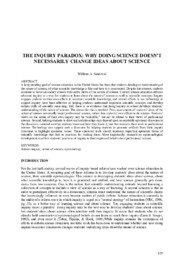| dc.contributor.author | Sandoval, William A. | en |
| dc.coverage.spatial | CY - Λευκωσία | en |
| dc.creator | Sandoval, William A. | en |
| dc.date.accessioned | 2016-02-22T06:29:11Z | |
| dc.date.available | 2016-02-22T06:29:11Z | |
| dc.date.issued | 2003 | |
| dc.identifier.uri | http://hdl.handle.net/10797/14744 | en |
| dc.description | Περιέχει το πλήρες κείμενο | el |
| dc.description.abstract | A long standing goal of science education in the United States has been that students develop an understanding of the nature of science, of what scientific knowledge is like and how it is constructed. Despite this interest, students continue to leave secondary schools with naïve views of the nature of science. Current science education reforms advocate inquiry as a way for students to learn about the nature of science as well as scientific concepts. Inquiry engages students in their own efforts to construct scientific knowledge, and several efforts to use technology to support inquiry have been effective at helping students understand important scientific concepts and develop certain skills of scientific reasoning. Still, there is no evidence that doing inquiry in school develops students’ understanding of the nature of science. The reason for this is twofold. First, assessments of students’ ideas of the nature of science universally target professional science, rather than students’ own efforts to do science. Students’ views on the nature of their own inquiry may be “scientific,” but not be related to their views of professional science. Second, helping students to draw such relationships may depend upon an explicitly epistemic discourse in the classroom, centered on what students know and how they know it, and that connects their work to professional science. Technology can support such a discourse by helping students to generate artifacts from their inquiry structured to highlight epistemic issues. These epistemic tools should represent important epistemic forms of scientific knowledge that link to practices for making them. Most importantly, research on epistemological development must link students’ practices of inquiry to their expressed beliefs about professional science. | en |
| dc.language.iso | eng | en |
| dc.publisher | Department of Educational Sciences, University of Cyprus | en |
| dc.relation.ispartof | Learning and teaching | en |
| dc.rights | info:eu-repo/semantics/openAccess | en |
| dc.rights | Open Access | en |
| dc.source | CBLIS Conference Proceedings 2003 Volume I: New Technologies and their applications in education | en |
| dc.title | The inquiry paradox: why doing science doesn't necessarily change ideas about science | en |
| dc.type | info:eu-repo/semantics/conferenceObject | en |
| dc.subject.uncontrolledterm | Science inquiry | en |
| dc.subject.uncontrolledterm | Nature of science | en |
| dc.subject.uncontrolledterm | Epistemology | en |
| dc.contributor.conferenceorganizer | Learning in Physics Group, University of Cyprus | en |
| dc.contributor.coordinator | Constantinou, Constantinos P. | en |
